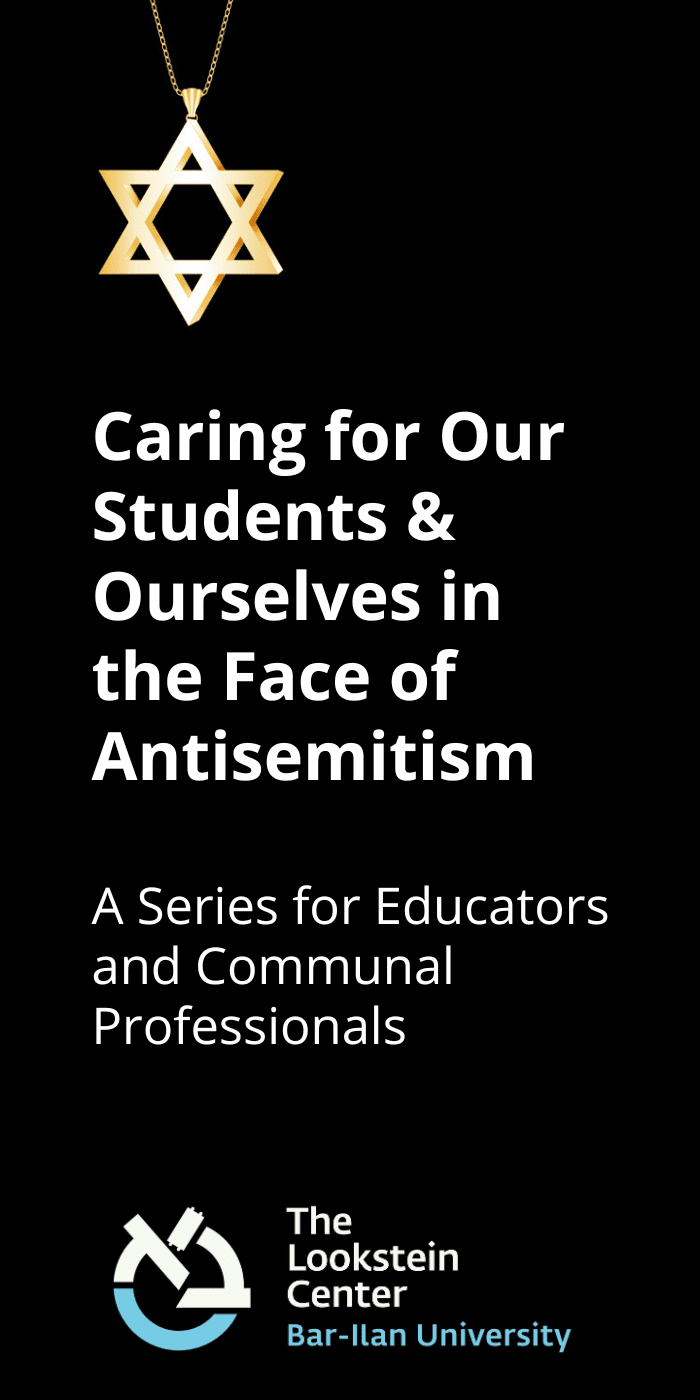Passion and Support: A path to teacher happiness

Nancy Sculnik teaches Yiddish and Jewish Studies at JPPS-Bialik. She holds a B.Ed., an M.Ed. and a GradCert. in Educational Leadership. Nancy is currently completing a Certificate in Inclusive Education in addition to working full time.
The year is 1999. I am sitting with my McGill University Advisor mapping out the next four years of my educational career. He looks at me with a smirk and says, “Yiddish? Why would you want to teach Yiddish? Who speaks Yiddish anymore? Now Hebrew—teach Hebrew. Study Hebrew, build your language skills, maybe an Ulpan or live on a Kibbutz. There will always be a future in Hebrew.” Hebrew, I thought? Not for me. While I learned Hebrew from Kindergarten to Grade 11, I was not connected to the Hebrew language. I had never been to Israel, I was not a regular synagogue goer, and my parents did not speak Hebrew at home. Hebrew was not a passion of mine.
So, I ignored my advisor’s advice and became a Yiddish teacher. Yes, Yiddish. While there is no Yiddish land, and I get the usual, “it is a dead/dying language,” Yiddish is in my neshama (soul), it is my mameh loshen (mother tongue), and above all, my connection to my past. Sitting in his office, I realized that my passion was to teach Yiddish. The question posed in this issue is how to “Attract, Retain, and Cultivate Good Teachers.” I believe that one answer lies in my story—passion. A good teacher must have a passion for what they are teaching, and the professional environment needs to help retain and cultivate it.
I have been blessed to work for a school for over two decades that has given me every opportunity to do just those things. As a novice teacher, I had the unique opportunity of being part of a department of Yiddish teachers who not only believed in the preservation of the Yiddish language, but who also connected with the students in meaningful, empathetic, and caring ways. My mentors at the time, who were my own former teachers, guided me as I navigated the waters of teaching high school Yiddish. When I transferred to the elementary school classroom, I was again nurtured by former teachers who helped me build my lesson plans, learn classroom management skills, and create meaningful relationships within the school community. My administrators at the time both understood the importance of mishpachah (family) and of kehillah (community) and created a deep sense of school pride and unity. These early experiences in my career were truly formative and taught me the importance of creating a community of professionals and learners. Over the past 20 years, I have gone back and forth between elementary and high school at the same K-11 school and now I teach from Grade 1 to Grade 11. My department heads, administrators, and teacher mentors have done nothing less than encourage me every step of the way.
My passion for Yiddish has always been recognized, and my supervisors have consistently encouraged me to attend seminars and workshops in my discipline, as well as to broaden my pedagogical learning in the area of best practices. In addition, the various administrative teams have always encouraged and supported my desire to further my post-undergraduate education, and to date, I have completed a Masters of Arts in Education, two Graduate Certificates in Educational Leadership, and am currently working on a degree in Special Education. I have done all of this while working full time and raising a family. I have taught a variety of subjects at a variety of grade levels and have been an administrator, a department head, and taken on many other different roles in the school. Every single one of those moments in my professional trajectory has allowed me to foster my passion for not only the subject(s) that I teach, but my identity as a professional teacher. Without the support of my leaders, I would never have been able to complete all of those milestones.
My passion for Yiddish is but one part of my story—the other part is the environment in which I work. This is the cultivation. I am fortunate to be surrounded by wonderful colleagues, a supportive administrative team, and an amazing school community. Our school adheres to a strong code of ethics and honor and teachers are consistently given the support they need to broaden their horizons, cultivate their passion, and grow as professionals. When this occurs, schools can retain those good teachers that are so very much sought after.
My story is but one of many. Teaching Yiddish is a mechiah (pleasure), it brings me naches (satisfaction) when my grade 1 students sing the songs that my Zaidey would sing to me, or shtoltskyte (pride) when my Grade 6 students sing the songs of the Resistance Fighters in the Vilna Ghetto. A Jewish school looking to attract, retain, and cultivate good teachers must first and foremost look for teachers who have that passion and spark and then seek out ways to enable them to nurture it. As the old Yiddish proverb says, “If you want your dreams to come true, don’t sleep.”



Nancy Sculnik teaches Yiddish and Jewish Studies at JPPS-Bialik. She holds a B.Ed., an M.Ed. and a GradCert. in Educational Leadership. Nancy is currently completing a Certificate in Inclusive Education in addition to working full time.
Reach 10,000 Jewish educational professionals. Advertise in the upcoming issue of Jewish Educational Leadership.





Nancy, just wow! What a fantastic article. You are such a treasure of a teacher. I am so proud of you and all your accomplishments!
Dear Nancy, It was a pleasure to read your article. You taught some of my children (Singer Family) and they were always eager to be in your class. Best to you!